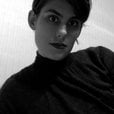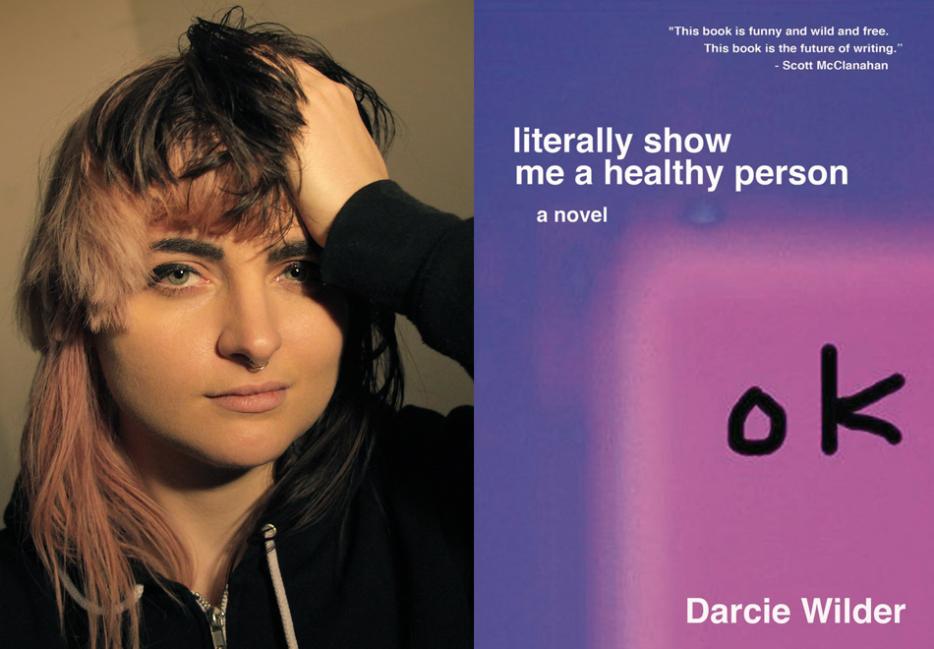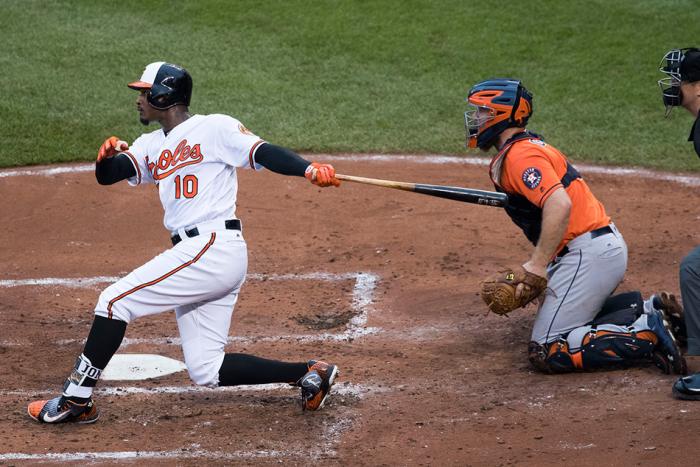“Is it okay that we’re already Twitter friends?” I asked my editors at this here ol’ Hazlitt Mag when they approached me about interviewing Darcie Wilder about her new book, literally show me a healthy person (Tyrant Books). I’ve interviewed a number of people for Hazlitt, but nobody with whom I was already friends, and I wanted to be transparent up front.
The problem is, literally everyone is Twitter friends with Darcie. She tweets under the super SEO-friendly handle @333333333433333 to over seventy thousand followers, sharing thoughts that could be considered jokes to a person who considers getting punched in the gut hilarious. Her fan base includes mall punks, sad people on the internet, myself, the people at MTV News (who hired Darcie to be the voice of their social media), and people who know what their moon sign is without needing to look it up.
[tweet_embed]https://twitter.com/333333333433333/status/605092807838183424[/tweet_embed]
literally show me a healthy person is very much a book of its time—the first line is “khdjysbfshfsjtstjsjts” [sic]—but it’s also an age-old story, somewhere between poetry and prose, about a young woman who is maybe named Darcie Wilder trying and learning how to be okay. Told in Speedboat-like fragments (including, yes, some under 140 characters), Darcie explores her own experiences with grief following her mother’s death, as well as recollections of lousy sex, decent sex with lousy men, and White Castle jalapeno cheeseburgers. For a book that sounds like such a bummer when I describe it, it made me laugh a whole lot.
Darcie and I spoke over Gchat, because both of us avoid talking on the phone unless absolutely necessary.
*
Anna Fitzpatrick: Hello Darcie
Darcie Wilder: Hi Anna, hello
Are you ready to talk about art, literature, and who can forget: truth?
Hmmmm *thinkyface emoji*
I think I am ready to discuss art, literature, and who can forget: truth.
If you are
Okay let's start.
You wrote a book! You are an authoress.
*Brandy voice* The book is mine
The first time I heard someone describe literally show me a healthy person, they called it a novel. So I pictured something, like, by Dickens, because he's who I think of when I think of novels. And in a way, your book is a little Dickensian. There is a sad child (you). But it’s not a novel, and it's not really a memoir. What would you call it?
[Several minutes go by. Darcie does not answer.]
Do you not like this question?
You get three "passes," like in truth or dare
JK you can have as many passes as you want
Hmmm. Yeah it’s tricky. Whenever anyone asks about it my face gets hot and I start stuttering and trailing off and they say, “You’ve really gotta work on this, Darcie.” And then I call it a novel, which is what the cover says. And it’s not a conventionally structured novel, but it’s a narrative. It’s kind of like, I guess, the literary version of an experimental documentary.
lmao lmao
You can also “pass” if my answers suck
[tweet_embed]https://twitter.com/333333333433333/status/672220431181611008[/tweet_em…]
Shhh no, we are both geniuses and we will behave as such.
Women are always apologizing for who we are. For being too confident, or too sure of our work, or for being too tall, or not tall enough, or for being somewhere in between, height-wise. So really we are feminist revolutionaries, talking right now.
Is it hard for you to talk about yourself?
Oh it's both excruciating and the opposite of excruciating. It took me a while to realize I both desperately love and desperately hate attention in incredible, exactly equal amounts. Also I feel like you can hate attention and desperately need it, which is the case for me.
Thank you for being a feminist revolutionary with me, Anna
I mean, there's tweeting about yourself, but that's different. There's a remove to it.
Yes.
Do you think about your audience when you tweet? You have a trillion followers—do you have an idea in mind who is reading what you put out in the world?
Yeah, I think about my audience all the time. I used to be more in tune with it, which would translate into being more strategic about posting, and I was better about forming relationships and DMing. But more recently I feel less in tune with it, maybe because of the swarms of bots and feeling differently about a lot after the election. I also feel like my audience is too large (please do not unfollow me) and I miss what it felt like around 2015. I don’t feel like I can be as open or fun or experimental. Now I'm like, who are these people? Why are you interested in me? I don't get it. But I do get it, because I've spent years working at tweeting and writing and presenting myself in this specific way. I've put in a lot of labor and thought, but sometimes I just think it's all absurd, or doesn't make sense, which is, I think, a way for me to dismiss myself.
[tweet_embed]https://twitter.com/333333333433333/status/738033102279299073[/tweet_em…]
It's kind of led to your career! You tweet for work, and there is a lot of overlap between your Twitter and your novel. Can you talk a little about how the book came to be? Were you approached about doing this?
Yes! My friend Spencer Madsen asked if I would be interested in writing a book for Sorry House, and I started assembling it (although it ended up coming out on Tyrant Books). In 2012 I started writing a lot of flash fiction and assorted small things in the same type of voice that drives the book. But I wasn’t sure what to do with it until I assembled a few pages for a zine in 2014, where I found the structure that became the structure of the book. Then with the prompt of a book, I began assembling the blocks of text and lines I had written into an arc with reoccurring themes and ideas. I looked through my tweets, too, so some of the book has been tweeted before, but it became this arc that I plotted out and filled in.
It really is a book that teaches you how to read it while you read it. At first, it seems like a bunch of loosely related thoughts, but then this story starts to present itself through these fragments. What, if any, books or movies or zines or conceptual art projects did you look to when you were working on this?
Stanya Kahn’s It’s Cool, I’m Good has been most influential on my work in general because of the tone she uses and the tension between humor and really dark concepts. I feel like there are two parts of my brain, the one that thrives off teen movies like Never Been Kissed and The Princess Diaries and Empire Records and Doom Generation and stuff, and then the other part that’s drawn to this stuff that might be difficult to sit through, like Peter Hutton’s films. Structurally, a lot of stuff that’s more lyrical like Putty Hill, or Joe Wenderoth’s Letters to Wendy’s, which also balances that existential dread, darkness, and humor. Also, always Maria Bamford.
Also I think the way Ted Berrigan talks about death in his poem “Memorial Day” [with Anne Waldman] has influenced me a lot in the way I recount my experiences with grief, I kind of always think of this one recording of him reading it.
[tweet_embed]https://twitter.com/333333333433333/status/683030075055431684[/tweet_em…]
When did you read that poem? Before or after you dealt with similar experiences of your own?
I think I found it right before my mom died, so around 2007. I originally heard the audio portion and then I found the whole poem, which was difficult because it's not online anywhere, and there are certain lines that have stuck with me for forever, and that as time goes on I'll stumble upon seemingly just when I need them. Like, "the heart stops briefly when someone dies, one slow stroke as they go from your outside life to your inside life. and everything continues, samely" didn't resonate as much in 2010 as it did in 2013, or vice versa.
That line is really lovely.
But he writes these long parts about people dealing with death and the ability to love, and it reminds me of having a running nose on a cold day, and just describing these moments right after learning that there's an incredible loss, these lists of actions that seem both innocuous and profound and I'm like: fuck, writing poetry about death and that feeling is like the hardest thing on the planet. Like it's soft and hard at the same time.
I think there is this idea of millenials on Twitter, doing the internet today, that everything is fuelled by a sense of irony. But there is a lot of (HERE IT COMES) truth in your work. You blend sincerity with these observations about how bleak or mundane or bizarre life can be even if it doesn’t make literary sense in a traditional way. (I think that’s why your followers like you) :)
You talk about developing this "voice" in your book. Is that your voice? Is there a difference between who you are as a person and who you are when you write/tweet?
Thank you! Yeah, I think people play up how much of the internet is “irony” when they really mean “self-aware” or something? I do think this book is my voice, or one of my voices. I think it’s confusing because I’m not sure what my voice or book means to someone else, the different associations or conclusions they’re drawing, so it’s difficult for me to subscribe to that. Like in those game shows where you pick a number and the curtain reveals what could either be a brand new car or a frying pan, and you’re not sure until it’s too late. Which I think is prevalent in my work as a major theme—“do these words mean the same thing to you as they do me?” or “do these words have power?” or “can you hear me?” or “what the fuck is going on?”
But yes, I think there’s a difference between who I am and what I tweet, I’m just not always exactly sure what the difference is at any moment. There are also some word associations or sentences that should exist in the world, and don’t need anyone to @-reply with a “well, actually” or caveat to the sentiment. Tweets are an imperfect medium, so I think there’s a lot of frustrating ways they can be received.
Does it ever get hard for you, getting personal? Especially when you write about your family? Sorry, that's such an anxiety-inducing question that makes me sound like "DARCIE, WYD?????" It’s an anxiety that I have when I write, this question of, why am I doing it? And I think for me ultimately it's trying to understand something about myself, trying to relate to others, trying to give others something to relate to, trying to get paid, and also I like the attention. But I wonder what it's like for other people.
Yes! Absolutely. Lately I’ve been freaking out because I really just didn’t think about my family reading it. For some reason I’m fine with getting really personal about myself, partially because if I do it and make it known knowledge, it feels more powerful and less like a secret, which feels like weakness. Even though boundaries and privacy are the opposite of weakness! But sometimes it’s hazy when my story ends and another person’s story begins, which is why I like reminding people that it’s a mix of fact and fiction.
But I learned to make art by making diary films, and would have a breakdown, like, every single time because of that “why am I doing this?”-type stuff. And I don’t know, but people tell me that it’s helpful. I mean, I’m not a journalist, this stuff isn’t saving the world, but it’s helping someone feel better, so it deserves to exist. There’s a lot of strife I could have avoided, and would be a better adjusted person, had I been exposed to the right pieces of art and writing that just helped me reconcile my feelings, and that stuff needs to be personal.
[tweet_embed]https://twitter.com/333333333433333/status/846902354871894016[/tweet_em…]
There's a power in talking about yourself, though, because you are controlling your own narrative. I mean, we are the same age (you are four days older), and we grew up on the internet when it was still a place for freaks before the normies took over, and our lives have always been intertwined with that. Like, all my secrets exist somewhere in old forum posts, or texts, or Livejournal entries, or tweets, or DMs, or emails, or whatever, and I used to be terrified of being doxxed. But now I make jokes about all of my secrets: I'm a pervert! Sometimes I want to die! And then they stop being secrets and start being things that get faves and RTs. There is a freedom in putting your shit out there, and being like, "So?"
YES
Or turning it into an essay or book and getting paid for it.
I just want to say the first public thing I put online was when I was on the Alternative Press forums and I asked what nu-metal was and why everyone hated it.
omg
But also, yes—so much crap online about me. So many mistakes and fuck-ups. For me, at least.
I have posts in the IMDB forums about why Legally Blonde is subversive and feminist and Legally Blonde 2 was just capitalizing on the success of the first and is a hollow shell.
oh my god
Luckily, IMDB deleted the forums earlier this year and no one will ever see them again. Do you remember your first experiences with ... THE INTERNET????
YES! I do. We got a computer in 1998 or 1999, I think. And then I was in some sort of special program in public school that gave us laptops, so I've mostly always had my own computer and grew up online. I didn't know how to have a conversation IRL until post-college, and have always been more comfortable typing and having the space to think about who I am and what I want to say before I do.
But even still, I wasn't super comfortable with it until 2012 when I started being more free—like, the first paragraph of my book is a Facebook status from February 2012, and I remember that was a turning point where I was open to sharing online instead of being scared and defensive and figuring out what I should be or do.
(But I had a million Xangas and Livejournals and used to differentiate whether they were for online or IRL friends for some reason.)
How did that feel?
It felt really freeing and different, but also scary. But once the switch flips, it was done. It's kind of like, "what's the worst that can happen" and "let'r rip" and "who cares," even though sometimes I really, really care.
God it is so hard not to care. I keep trying to be cool on the internet but then I care too much and ruin it.
Ugh, same. You have to care a little, I think. Nihilists are terrible.
It's weird because it seems that there is this crop of Twitter people who are becoming more visible who combine not caring with political activism. And it seems to be a competition about who can be the most right, or clever. And I want to ask, "but what do you CARE about?"
I identify with what you're saying. People care about those faves and RTs, and they also care about calling out people for caring about those faves and RTs. It's also weird that very serious thoughts and feelings are on the same timeline as jokes, etc.! I miss message boards where we separated things out more. I think people quit Twitter altogether because we are in one big room having a lot of conversations that require very different tones and moods, and it takes a lot to have them simultaneously—it's the best and worst part of Twitter.
[tweet_embed]https://twitter.com/333333333433333/status/844539217422245888[/tweet_em…]
Final question
DUN DUN DUNNNNNNN
omg!
How are you feeling?
In general or right now?
Yes.
Everything.
LOL
Right now I feel grateful and content because I enjoy talking to you, and this has made me remember that I like my book and my life and making work and art and writing in general. I also had a lot of coffee and nice time with my coworkers today, which are two of my favorite things. I'm also a bit anxious and scared because I always am. How are you?
I am good because the weather is getting nicer and I'm talking to my pal Darcie and she is interesting! I am a bit stressed because I don’t know where I’m going in life and I don’t know if that even matters in this current political climate. But I wrote down all the artists and poets and filmmakers and stuff you messaged above, and I'm looking forward to checking them all out later.
And I love your book and am happy you are putting it out in the world.
Thank YOU. Ugh I'm glad you like it. Recently I looked at it and was like, "Oh, I understand how someone could hate this," and like, okay, fine.
[tweet_embed]https://twitter.com/333333333433333/status/644713259334004736[/tweet_em…]






